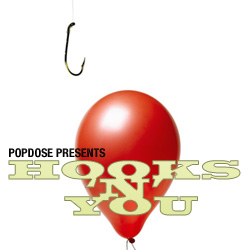
There are no two ways about it: were it not for the Trashcan Sinatras, I would not be where I am today.
This is in no way an overstatement. The facts are these: many moons ago, I joined the E-mail list in support of a highly underrated band from Irvine, Scotland, where I proceeded to become friends with many of the other individuals on the list. One of those friends was Popdose’s own David Medsker, who pitched me to the CEO of Bullz-Eye.com as someone who was worth bringing on as a contributor. The end result was that, after almost two decades of looking, I was finally in possession of one of the rarest positions in all of journalism: a full-time, work-at-home writing gig. And if I hadn’t been writing for Bullz-Eye, then I wouldn’t have been able to tell David about this awesome column called “Captain Video in the 1980th Dimension,” which made us both laugh so hard that he was inspired to ask its author – one J. Giles – if he’d be interested in becoming a Bullz-Eye contributor as well, a decision which ultimately led both us to become members of this wonderful world that we all know as Popdose.
You can imagine, then, just how important the Trashcan Sinatras are to me.
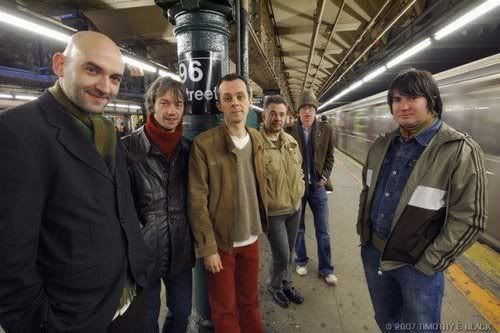
One could easily argue that any of the band’s albums would be worth of a spotlight within “Hooks “ËœN’ You,” since none of them have ever really achieved what you’d call tremendous success. Their debut, 1990’s Cake, certainly came the closest, with “Obscurity Knocks” and “Only Tongue Can Tell” earning enough airplay on college radio and MTV’s late, great “120 Minutes” to leave the band’s name cemented even now in the memories of those who heard them at the time. Sadly, the follow-up, 1993’s I’ve Seen Everything, came out in the wake of grunge’s arrival and didn’t get the kind of notice it deserved, but at least the video for “Hayfever” managed to earn momentary fame when it turned up in an episode of “Beavis & Butthead.” By the time the Trashcan Sinatras released their third album in 1996, however, their stock in the States had dropped to a point that A Happy Pocket didn’t even manage a release on these shores. This has always seemed more than a little ironic to me, as it was this album which really made me love the band unconditionally, with songs like “The Main Attraction,” “Twisted & Bent,” and “How Can I Apply?” seeming easily as iconic to me as any of the singles which preceded them. Of course, I realize that the biggest reason for this is that the album was released when I first joined the aforementioned Trashcan Sinatras E-mail list, but I think you’ll find that almost everyone who’s ever heard A Happy Pocket will gladly tell you that it really is one of the best albums you’ve never heard…and, yes, that includes the cover of Lulu’s “To Sir, With Love.” (Hey, my 3-year-old daughter swears by it!)
Unfortunately, the fact that no one heard A Happy Pocket meant that it would be eight long years until the band finally put out a follow-up, but when Weightlifting finally emerged in 2004, at least it showed up in the U.S. as well. It wasn’t really what you’d call a hit (though lord knows that, with songs like “All the Dark Horses,” “Freetime,” and the title track, it certainly deserved to be one), but it still managed to raise their profile far higher than it had been in more than a decade. Bad luck, though: the label – spinART Records – filed for bankruptcy a few years later, leaving the band once again without a home.
Fortunately, the band has never been described as a bunch of quitters, so they’re still plugging away, and the release of their latest endeavor, in the music, is decidedly imminent…so much so, in fact, that the Trashcans are embarking upon a US tour. As a result, one of their greatest supporters – Joe DiMaria, who’s been a mate of mine ever since I joined the list – asked me if I might able to find it in my heart to chat with someone from the band in order to help spread the word about these upcoming events.
Yeah, like I really needed to think long and hard about an offer like that.
Here’s one bit of fair warning, however: this is a fairly free-flowing interview. It has on at least one occasion been suggested that, as a journalist, I have a tendency toward becoming inappropriately comfortable with my interview subject, thereby finding myself prone to making decisions within the conversation as if I was talking to a friend rather than a professional musician. I can’t really argue with that, but with one notable recent exception, this tendency has rarely steered me wrong, and when talking to Frank Reader, the lead singer of the Trashcan Sinatras, it must be said that I do feel like he is a friend of sorts…albeit one I’ve never actually met in person. It’s also worth noting that I quickly learned that Frank is a man who, all things considered, would be quite happy talking about almost anything but his own music. Not that we didn’t do a fair amount of that, but as you’ll see, there were many tangents throughout the course of our conversation. In fact, we spent the first five minutes barely talking about music at all, chatting about what I do for a living, how I’m going to try to make it the show at the Troubadour on July 29th, where I’m staying when I’m visiting California (the Langham), and how he and his wife stayed at the same hotel for their anniversary. Eventually, though, we got down to brass tacks.
Popdose: Well, I guess we should actually talk about the band for a bit.
Frank Reader: Ah, if we must, we must. We’ve actually just been practicing. I don’t like talking about them, you know? I find it hard in interviews. I find it’s easier if we just start chatting away, and things will just eventually come out of it, anyway.
(Laughs) I’m fine with that, too.
You’ll probably be more enlightened about the record just from talking to me about my family than you would talking about my music. It’s all just a mystery to us. Yesterday was our first rehearsal in years. Two of us are in L.A. now, and the two that are out here hired…well, found a bass player, I should say…and asked him to join the band. We needed someone for the tour, but we actually found someone that we liked so much that we asked him to join, so the three other guys have come over from Scotland just to meet him. It was a bit like we were presenting them with our choice, so it was kind of nerve-wracking, you know? But he’s very musical and a fantastically positive guy, and everybody was very impressed with him. We were actually playing and remarking to each other how it was the first time we’d actually played together since we recorded the new album in December ’07.
Wow.
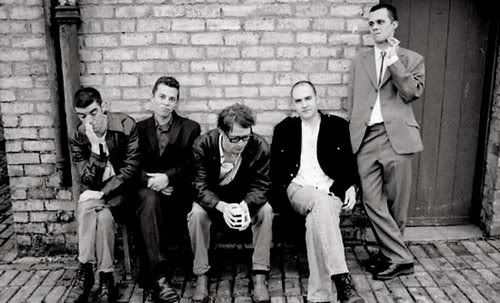
Yeah, because it took, like, seven or eight months to get it mixed and into that stage, because we do it all ourselves and it’s in piecemeal fashion, so it drags out a wee bit more than you’re financing it yourself. Which is okay. As long as you can keep the focus. And we were lucky with the producer, as he was very focused on it. But as I say, we were talking about how strange that was. That’s probably the longest gap we’ve ever had! And most of the songs on the album were recorded a little bit…we had a few weeks rehearsal in Glasgow beforehand, but a lot of it we were getting the feel of it, which was a new thing for it. So it wasn’t like these were songs that we’d rehearsed the hell out of before we recorded them, you know? It was strange, because we were, like, “Do we actually know what we’re doing here?” It just sounded horrendous! But it comes out. I was moping later, saying, “This is terrible! We sound terrible! Are we going to sound all right?” And were looking for reassurance, but everyone else was, like, “What are you talking about? It’s fine!” We were all just listening to our own individual selves, and no one was listening to everything as a whole. But as a singer, I was sitting back and listening, waiting to be blown away. John says he spent half the time just reacquainting himself with his pedal and making buzzy sounds. He’s been touring a lot, and everybody’s been playing a lot of music. Frank, our new bass player, he’s busy all the time, but John plays with my sister, who’s a singer…
I’m familiar. (Laughs)
…and she’s his partner. They two have been de facto married, anyway, for ten years or so, but John plays in her band, so he’s been very, very busy…though mostly on ukulele. (Laughs) So he’s been reacquainting himself with a Les Paul. I don’t know if you’ve ever heard my sister’s music, but it’s kind of folky jazz. Her new album’s a bit more jazzy, and he’s been playing with her on that and touring all over the place.
Oh, I’ve definitely heard your sister’s music. I’ve been a fan of Eddi’s since the Fairground Attraction days.
Oh, wow! Well, yes, she’s absolutely phenomenal, and she’s a real hero of mine, a great guiding light for me throughout. But, then, she’s my big sister. She’s fantastic, and she’s always been a positive person…and growing up in working-class Glasgow, that’s not really that commonplace! It’s not a bastion of positivity. I think she took a lot of blows from people who thought she was crazy and flaky and all that, but she just kept up her determination. She wanted to be a positive person and find a way of breaking the cycle you have in life. Like, sometimes when you grow up in a big family…or any family, I suppose…you just follow in your parents’ footsteps, but to try something new…? Growing up in the ’70s, when she was a young teenager, she wanted to be a singer, and with my father a welder and my mum was a school dinner lady, you can imagine the look on their face! (Laughs) They were very supportive, and she was a wonderful singer and still is, but it was kind of understood that she would sing at parties and that’s it, you know?
I would expect the reaction would basically be, “Good luck with that.”
Yeah! “Make sure you stay in school!” But she didn’t want to go to school or anything! She was a real bonafide hippie, she had the long dress, long hair, and long everything, with the glasses and the chains, and she wanted to go and live in France when she was 16 and pick berries. She lived with a guy who made teeth! (Laughs) He did! He made his living making people’s teeth! But she did it, and I’ve always had so much admiration as well as love for her because she did all that stuff. She’s the real deal. She was a real busker, and even now, when she plays, she hates any kind of restriction on her playing. She’s been working with John for many years, of course, and everyone knows that she says at the drop of a hat, “I want to do this now!” But she’s great. She’s an inspiration.
So where were you with your music when “Perfect” topped the charts? Had you just gotten started?
We’d just gotten started. I think we’d been together for a year, maybe, at that point. It was 1988, I think, and I was actually with her the day she found out it had gone to #1. We were in an old part of Glasgow where we’d all grown up, and me and her stopped to buy a bag of chips, and the radio was on in the chip shop, and…I’m sure you know that she kind of knew it was going to be #1, because you kind of hear things. The RCA man had tipped her a wink and said, “Everything’s fine, don’t worry, we’ve paid the right people,” or whatever, so she had kind of known it was going to be #1, but she found out when we were in the chip shop, and it was kind of nice to be a part of her life when that happened. As far as the band, we were really excited for her, and it really helped my relationship with my mum and dad, trying to be a young guy who’s not working a proper job but trying to be in the band and work in music. They had seen that it was possible, so it really helped in that way. But in another way, I think my mum and dad kind of expected me to have a gold record the first time as well. (Laughs) But what the large print giveth, the small print taketh away, as Tom Waits says. But we’ve always been really supportive of each other, me and Edna, so it was a great thing to see her have that success. But I knew she was uncomfortable with it, you know? She’s pretty self-conscious and quiet…well, she was then, anyway. She’s much more confident now. But she was thrust into it really quickly, and she suffered some pretty cruel journalism from the NME and Melody Maker, people calling her ugly and things like that, because she was kind of unusual looking. But she’s absolutely beautiful, you know? It was kind of a weird, bumpy ride for her, too, and that band broke up really quickly. To watch that happen was kind of painful.
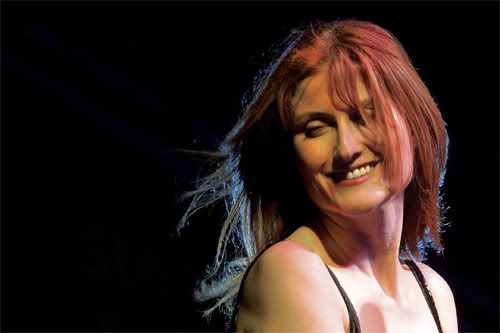
But she did, at least, step forward on her own and, at least from my perspective, seemed to do pretty good for herself. I don’t know how well it did in the charts, but her solo material was certainly acclaimed, anyway.
Yeah, but I think that, having had a #1, she was feted a little bit by her record company, and, you know, those people, they’re vampires. I mean, they really want the same thing all the time as soon as they get a formula. They just don’t want any changes. She had so many ideas, and they would come out in flashes, but you could definitely tell that she was getting more and more frustrated, and it wasn’t really until she went to Rough Trade and Geoff Travis took her under his wing that I think she felt the freedom to make the kind of records that she really wanted to make. So, yeah, it was kind of weird on the face of things. She was lucky to have that success because it gave her that. We were the same with our first album.
Actually, I was going to ask how much freedom you guys had on Go! Discs when you first signed to them.
Yeah, well, I mean, the thing about a major label is that they can do that for you. They can get your name out there and, for good or for bad, a lot of people will be able to make up their minds about you. That’s the hardest part nowadays, I suppose, making a record for a new band. The attraction is there to make it yourself, but getting heard is so hard. Now, do you make music yourself?
I do not. I’d love to tell you that I do, but I’m one of those horrible critics who can only write about other people’s.
(Laughs) Oh, that’s all right. You’re a master of your own trade! You know, it’s just so difficult for new bands to get heard, and she was lucky that we caught the tail end of that, the last of the major labels’ dying breath. They were throwing money at indie music, and they weren’t necessarily sure it wouldn’t succeed. Nowadays I think major labels are a bit more coy about that. But we can still feed on what we gained back then, you know? Like you say, there’s you guys on the list and the website. I think Go! Discs were quite quick on the wave as well. I remember in ’95 or so we got our first list-serv up, which was really early. I don’t think I’ve met another band who was doing it in those first months that we were doing it, so we were lucky in that respect as well.
You definitely have a rabid fanbase, to say the least.
Yes! (Laughs) And it’s funny, though, because when last we played gigs in L.A. or in Glasgow, there’d maybe be 800 or 1,000 people there, but only maybe 2% are aware of our website or have been to it. That was the last time we toured, so maybe it’s changed now, but it’s funny how you think that that’s your fanbase, but your fanbase is actually spread wider than that. In my experience, at least.
With Cake, it felt like you guys burst onto the scene out of nowhere and, at least for a few minutes, you were the heroes of MTV’s “120 Minutes.”
Ah, yes, on “120 Minutes” for a few minutes. (Laughs) We got a couple, anyway.
Did you feel like you were making headway with that first album when you first came over to the States?

You know, we felt a little bit like…well, Paul was 17 when that happened, I think. George is a bit older than me, but Paul was definitely 17 or 18. We were rubbish back then. We could barely make a noise back then, as far as musical sounds. We were definitely ropey. There was something we were talking about recently, me and Paul, that we never really see crap bands anymore. Not just in L.A., but it’s happened in Glasgow, too. You go to, like, King Tut’s or wherever to see a mid-sized band, and they’d have a local support, and the local support is bang on the button! And we were, like, whatever happened to really crap bands that couldn’t actually play? I used to go see bands where the bass player would be reading his music out of a book, and he’d have to stop to turn the page! (Laughs) We were just a small notch about that. We didn’t have a clue about amplification, we didn’t have a clue about anything. It was all manic energy. I just threw myself into it like a maniac, drinking like crazy and throwing myself about, just to distract from this crazy noise that we all thought was unlistenable. ‘Cause Cake was made quite carefully in the studio, and it’s a studio record. Unfortunately, I think we might’ve learned a few bad habits from it, and I’d have to take the blame, because I’d done engineering before that. It was all very ’80s and built up from scratch. I mean, it has its merits, but when we took it on the road, it was very much like a deer in the headlights. It was chaotic, that’s how I remember it, and I can barely believe that it happened. We were coming over here for the first time, and people were screaming at us during gigs. It was very silly.
Some friends of mine have very fond memories of seeing you at the 9:30 Club in Washington, DC.
Ah, yes. A couple of the gigs I remember, and the 9:30 Club I remember, because I remember how weird it was. I think it’s very different now…
Actually, it’s a completely different building now.
Yeah, because we played there when we toured for Weightlighting, and I was, like, “What is this?” The last time, I remembered, was low ceilings, and possibly pillows in front of you. Something to lean on. I think we played it twice, though I may be mixing a couple of gigs up. But we were doing weird cover versions at the time, I remember, trying to flesh out our set…because we only had, like, ten songs! We weren’t like the Beatles in Hamburg. We had nothing, really, except just the bare bones, and we were trying to flesh it out by doing covers like “Don’t It Make My Brown Eyes Blue” and “I Do, I Do, I Do, I Do, I Do,” by ABBA. We were doing Charlie Rich! I don’t know where we got them from. Maybe my mum’s record collection. I think that’s where we got these ideas. But we were always big country fans. It’s always been big in Scotland, particularly in the west of Scotland. We’ve got a Grand Old Opry in Glasgow.
Really? I didn’t know that!
Yeah, I think it’s the only official one outside of Nashville. And people go dressed up as cowboys and have fake shootouts, and there’s line dancing, though I think that’s a relatively new thing. But growing up, all of my uncles loved all that stuff. My dad was a huge country and western fan.
Hey, I grew up listening to Johnny Cash’s “Live at Folsom Prison.”
Well, we were a bit cheesier than that. We were more Crystal Gayle. (Laughs) It took awhile before we got into George Jones and Gram Parsons and that kind of stuff.
I’ve been through Crystal Gayle, Dolly Parton, Ronnie Milsap, all of them.
A-ha! And it never changes, really. There’s a certain period in your life, I think, where if music is something that you’re passionate about and it’s something that gives you a thrill…what you feel about the music in a critical way doesn’t come into it. If I hear anything from, like, the year 1979 or 1980, when I was first just getting knocked over by music, reading the charts every week and taking the radio to school, it doesn’t matter what the record is or if it’s the craziest comedy record or whatever. It just gives me such a thrill of nostalgia that I can’t not like it and can’t not enjoy that moment. It’s not about the record.
I know what you mean, though it took me years to appreciate that. I went through the same stage that everyone goes through, where I was, like, “I’m too cool to like this.” But then, at a certain point, I realized, “Who am I kidding? I grew up listening to Barry Manilow, and I can still appreciate this!”
Absolutely. “Weekend in New England” is a great song! (Laughs) I love a bit of Mr. Manilow. You’re right, though. It was hard on our psyches to grow up and make these musical strides in a harsh critical glare, for the most part, because we were pretty confused and never really confident, you know? We only really got confident, like, maybe about a year or two ago! Something like that. Honestly! And yesterday all the confidence was away again. But it’ll come back. It just felt like, “Is this the right time? Is the music we should be making?” And, also, the record company had a pretty strong influence on us. We weren’t headstrong people, you know, and we never have been, really. We are a bit more now, I’d say, but we were very kind of…we would make the music that we felt came from our heart, and then the record company would say, “Hey, that’s great, but can you change it a wee bit?” (Laughs) And we’d be, like, “Okay, if you like,” and we’d lock ourselves back in the studio and have a go. But what we didn’t know was that it was eating away at our confidence a tiny bit at a time…and then you wake up and it’s 1996 and you’re going, “Is this good?” So we had that period as well. It’s strange that what it takes to get you off it can sometimes seem on the surface to be really awful…like, in our case, the bankruptcy. Or losing a record company deal and being dropped. Whatever. All of these things that seem really calamitous are actually blessings at the end of the day.
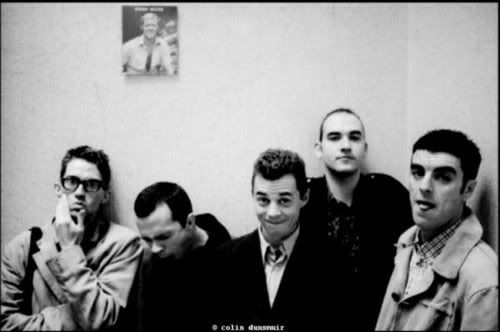
And, obviously, I don’t want to dwell on that stuff, but I was curious: do you often wonder how many black cats have crossed your path over the years?
No, you cannae give that any momentum. You can’t afford it. You’ve got to remain positive. We’ve so much to be thankful for. There are four of us that have played together for almost twenty years now, and we’ve gotten so much out of just playing together. John and Paul, when they play guitar together, they’re just amazing. They just read each other very well. It’s kind of frowned upon to stay together in rock and roll, you know? But when John and my sister got married, that was in the middle of a time when we didn’t really know what we’d be doing next, and there was an element where we were, like, “We really have to accept each other or leave each other.” And we accepted each other, of course, and, y’know, we’ve grown to love each other and have learned how to treat each other properly. I think that, when we grew up together, we were very Pink Floyd-y about it. Nobody was saying anything, nobody was actually helping each other out of their problems, and we were feeling a little isolated. We had the camaraderie, but that’ll only take you so far. And now we have, I think, because we’ve been together so long and feel a bit of an element of “fuck it” and, you know, this is what we’re doing. It’s a vocation for us, and we actually enjoy each other’s company. Like I said, John and his brother are kind of my family, too. We’re much more comfortable with our music now.
Join us next week…no, seriously…when we return with more from Mr. Reader.




Comments